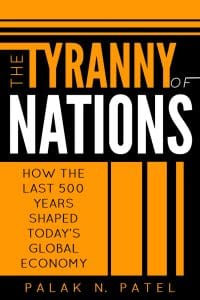
The royal phoenix is missing from the Tang dynasty palace! Princess Pingyang is worried. Can Rin the unicorn find Fan the phoenix? Together with her friends—dragon, tiger, and tortoise—Rin embarks on a journey to mystical lands in China.

The royal phoenix is missing from the Tang dynasty palace! Princess Pingyang is worried. Can Rin the unicorn find Fan the phoenix? Together with her friends—dragon, tiger, and tortoise—Rin embarks on a journey to mystical lands in China.

The Tyranny of Nations places the ground-shaking political and economic events of modern times in context. Palak Patel draws on his experience investing in government bond markets to demonstrate how the present fits a specific historical pattern that has defined the past 500 years.

Why did modern capitalism not arise in late imperial China? One famous answer comes from Max Weber, whose The Protestant Ethic and the Spirit of Capitalism gave a canonical analysis of religious and cultural factors in early modern European economic development. In The Religions of China, Weber contended that China lacked the crucial religious impetus to capitalist growth that Protestantism gave Europe.

The Story of the Stone (also known as Dream of the Red Chamber) is widely held to be the greatest work of Chinese literature, beloved by readers ever since it was first published in 1791. The story revolves around the young scion of a mighty clan who, instead of studying for the civil service examinations, frolics with his maidservants and girl cousins. The narrative is cast within a mythic framework in which the protagonist’s rebellion against Confucian strictures is guided by a Buddhist monk and a Taoist priest. Embedded in the novel is a biting critique of imperial China’s political and social system.

This friendly guide offers concise but detailed demystifications of more than 85 aspects of ancient and modern Japan.

A funny and intimate travelogue of one woman’s unexpected adventures in Japan. French illustrator Julie Blanchin-Fujita arrived in Tokyo for what she thought would be a one-year stint, and ended up never leaving.

At 8 years old, Grace Eiko Nishikihama was forcibly removed from her Vancouver home and interned with her parents and siblings in the BC Interior. Chiru Sakura—Falling Cherry Blossoms is a moving and politically outspoken memoir written by Grace, now a grandmother, with passages from a journal kept by her late mother, reflecting on their family history, cultural heritage, generational trauma, and the meaning of home.

Many Filipino Americans feel obligated to give charitably to their families, their communities, or social development projects and organizations back home. Their contributions provide relief to poor or vulnerable Filipinos, and address the forces that maintain poverty, vulnerability, and exploitative relationships in the Philippines. This philanthropy is a result of both economic globalization and the migration of Filipino professionals to the United States. But it is also central to the moral economies of Filipino migration, immigration, and diasporic return. Giving-related practices and concerns—and the bonds maintained through giving—infuse what it means to be Filipino in America.

The Russian cultural presence in Japan after the Meiji Revolution was immense. Indeed, Japanese cultural negotiations with Russian intellectuals and Russian literature, art, theology and political thought, formed an important basis for modern Japanese transnational intellectual, cultural, literary, and artistic production.

In her brilliant second collection, Carlina Duan illuminates small and sacred moments of survival. Tracing familial lore and love, Duan reflects on the experience of growing up as a diasporic, bilingual daughter of immigrants in the American Midwest, exploring the fraught complexities of identity, history, belonging, and linguistic reclamation.
You must be logged in to post a comment.